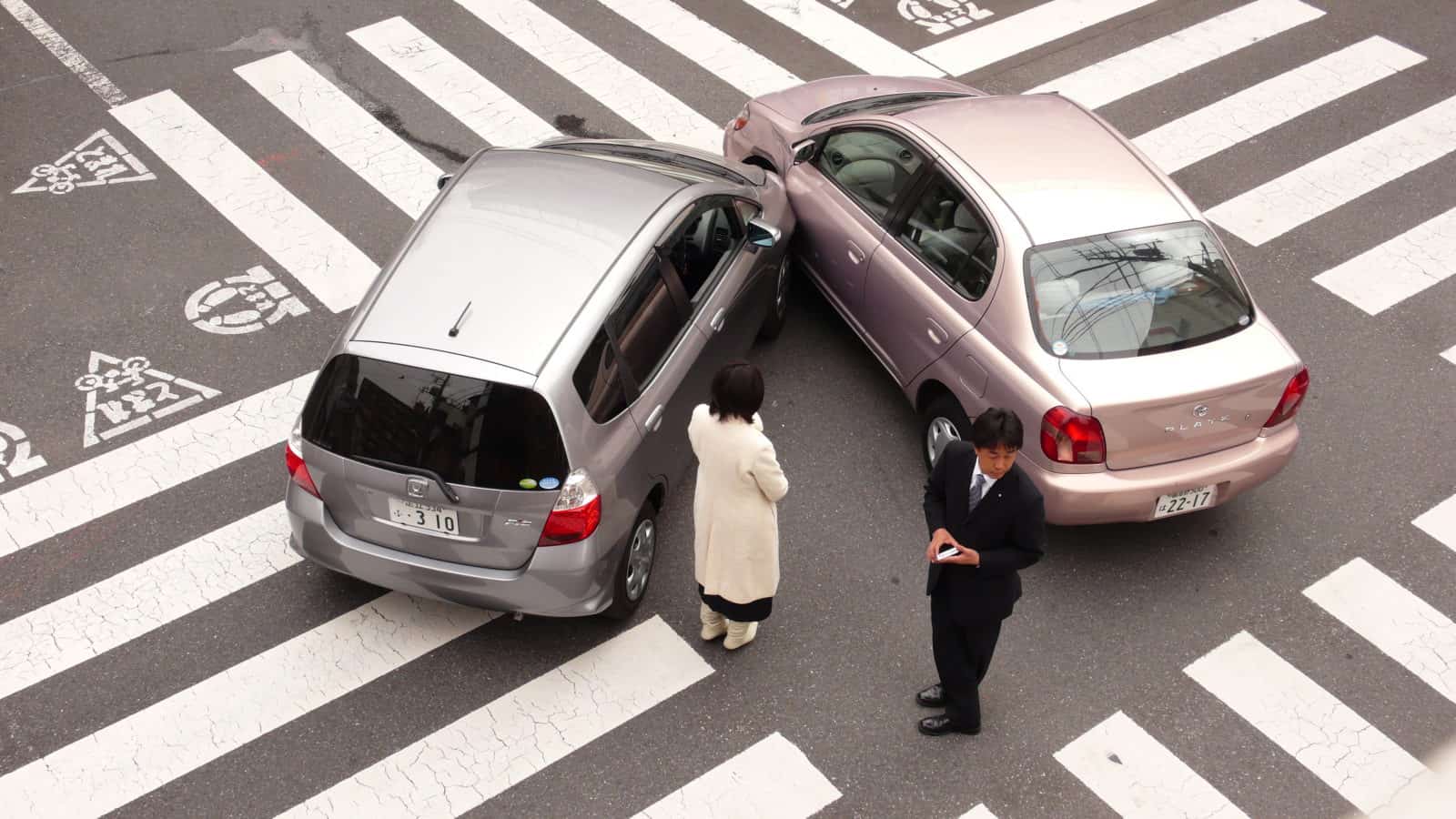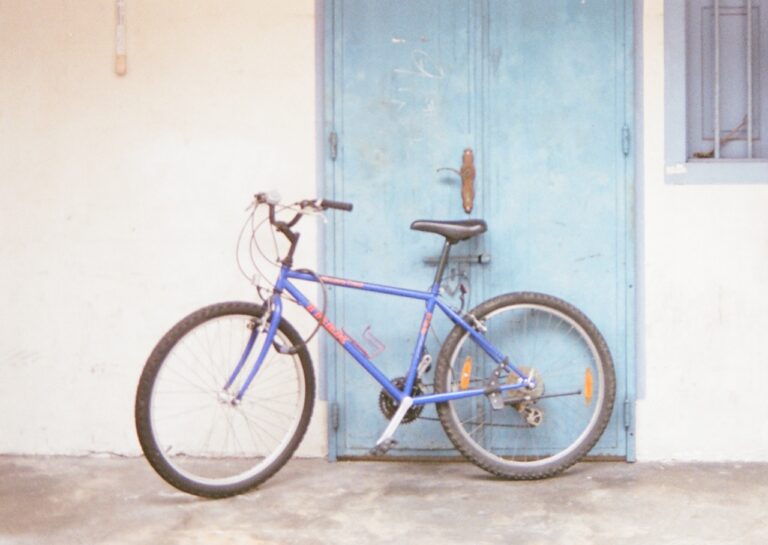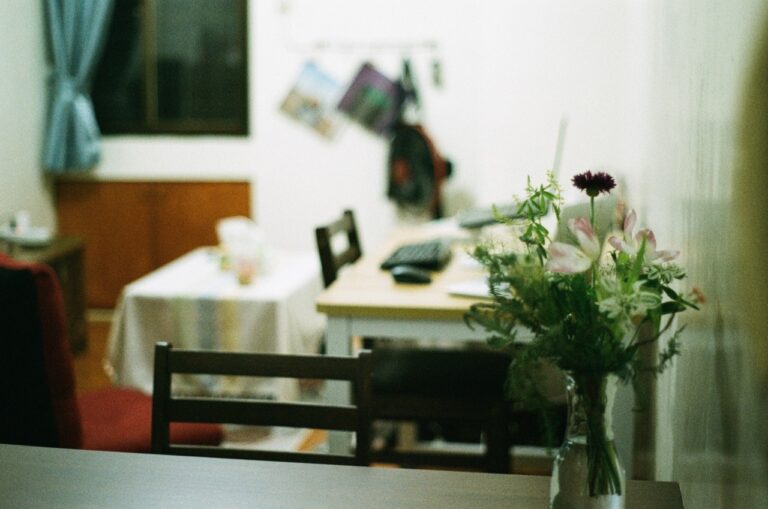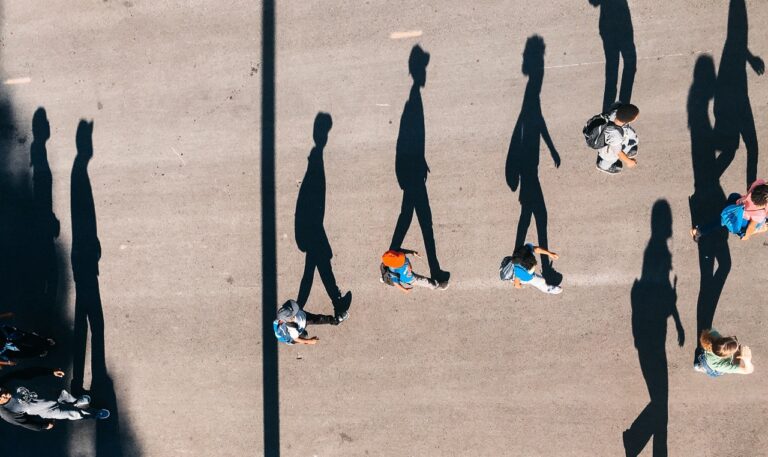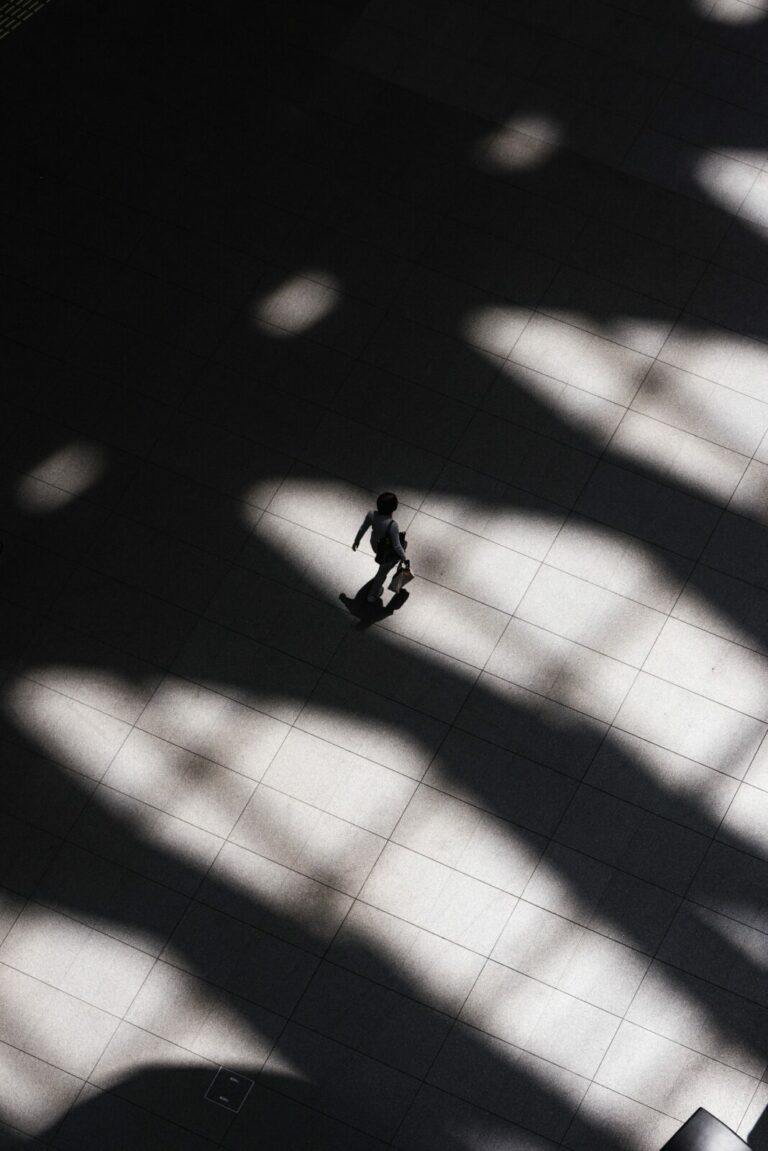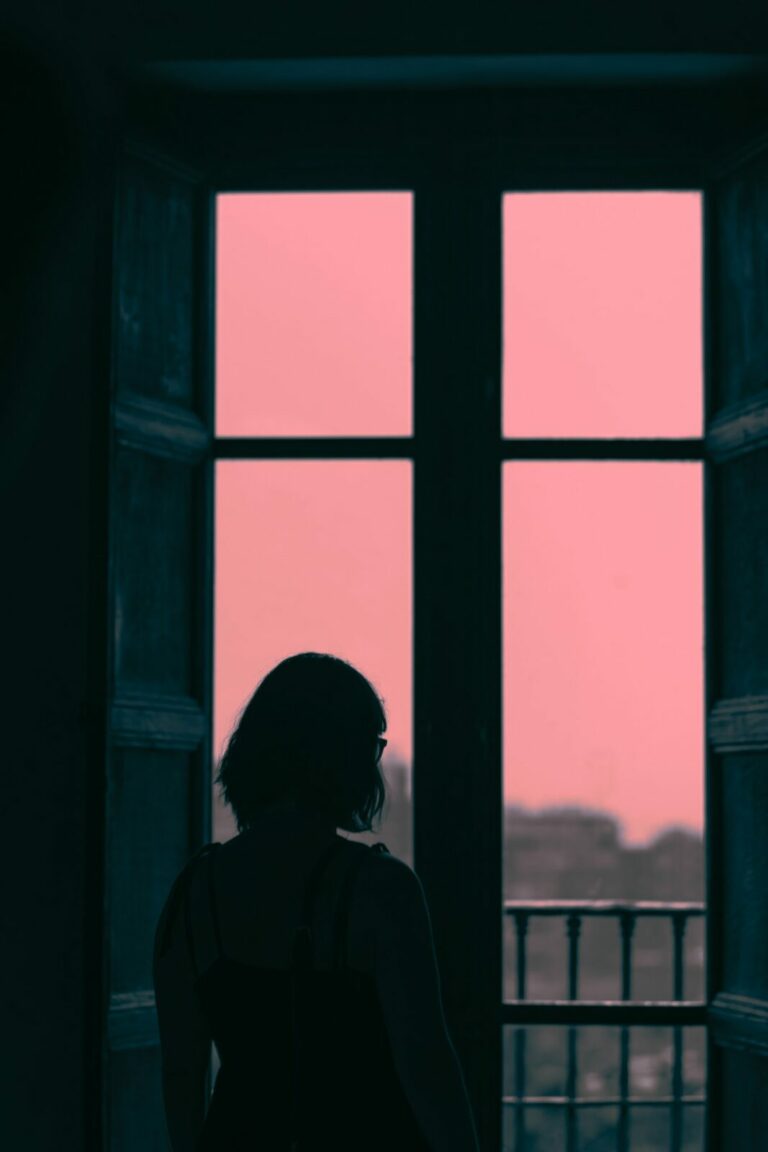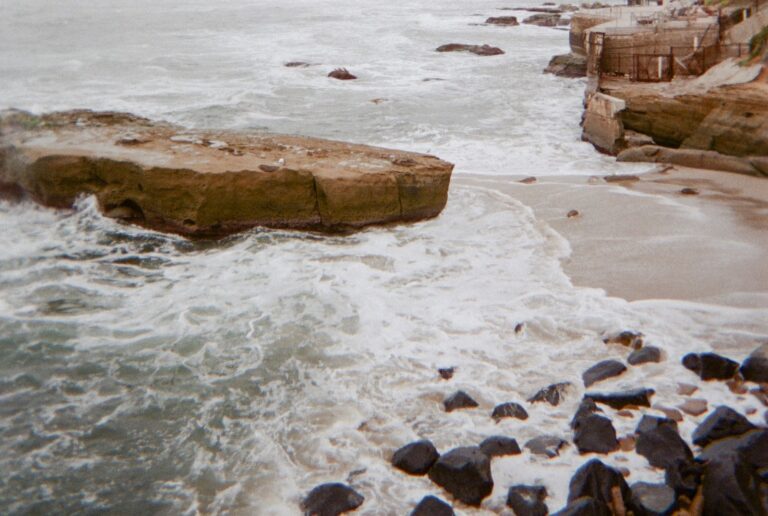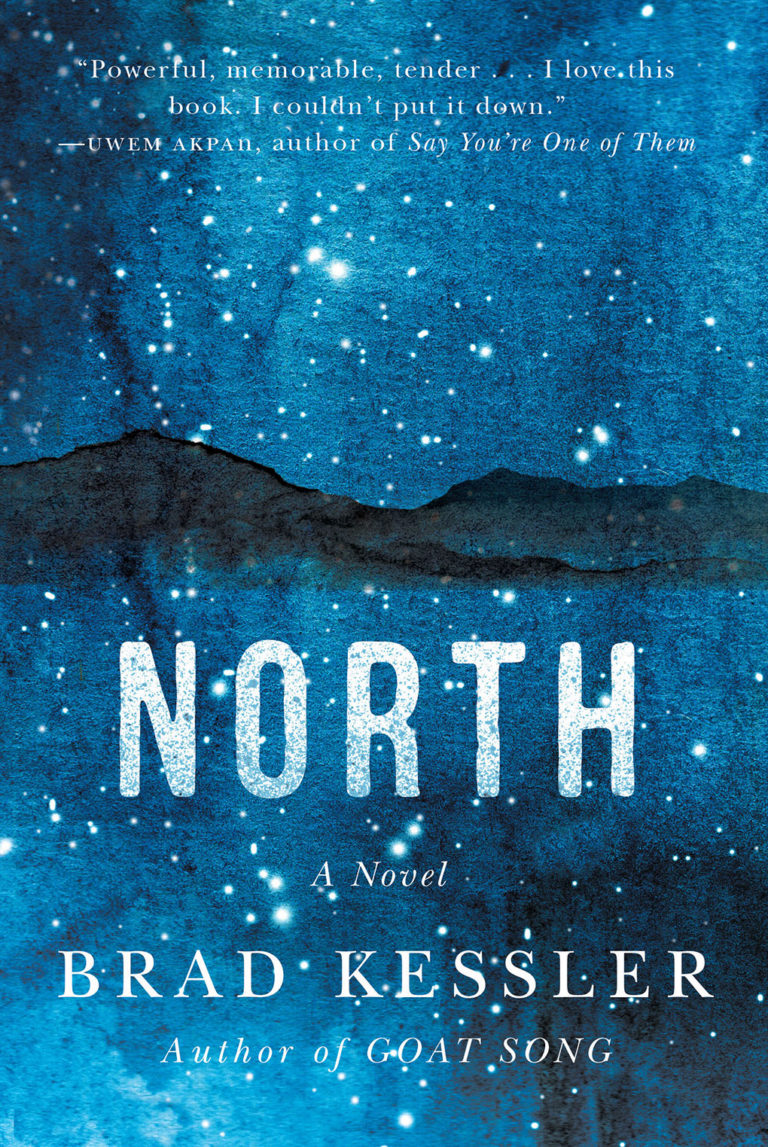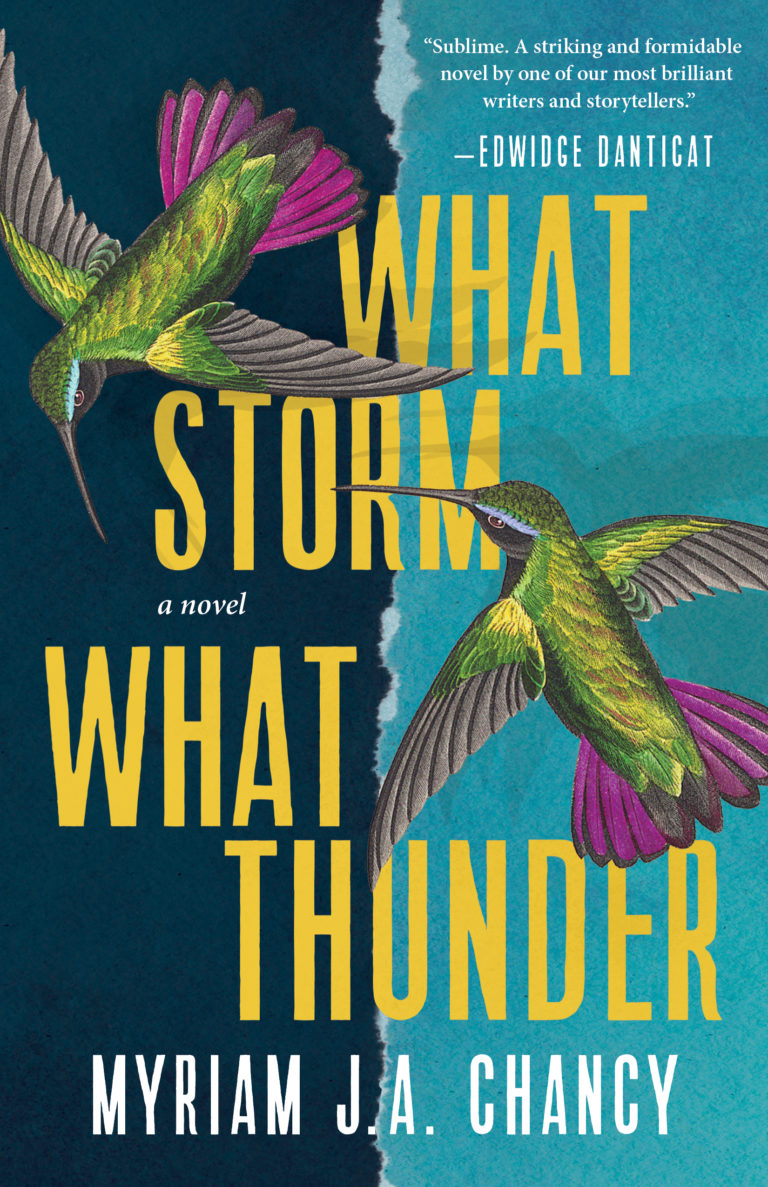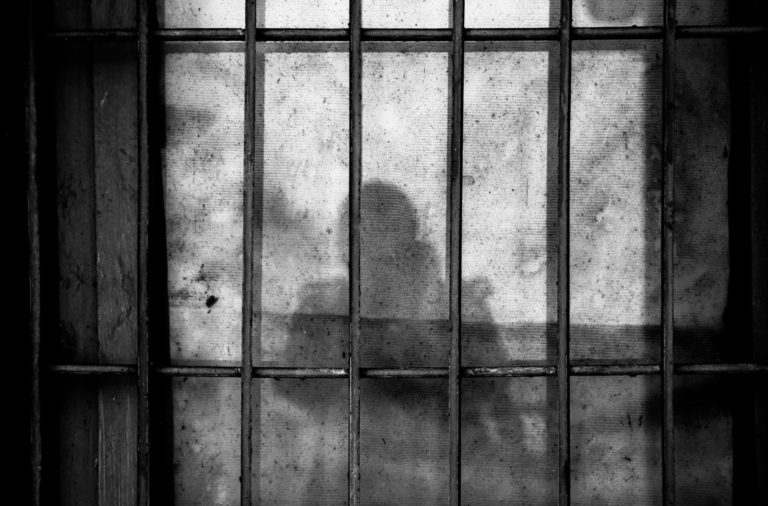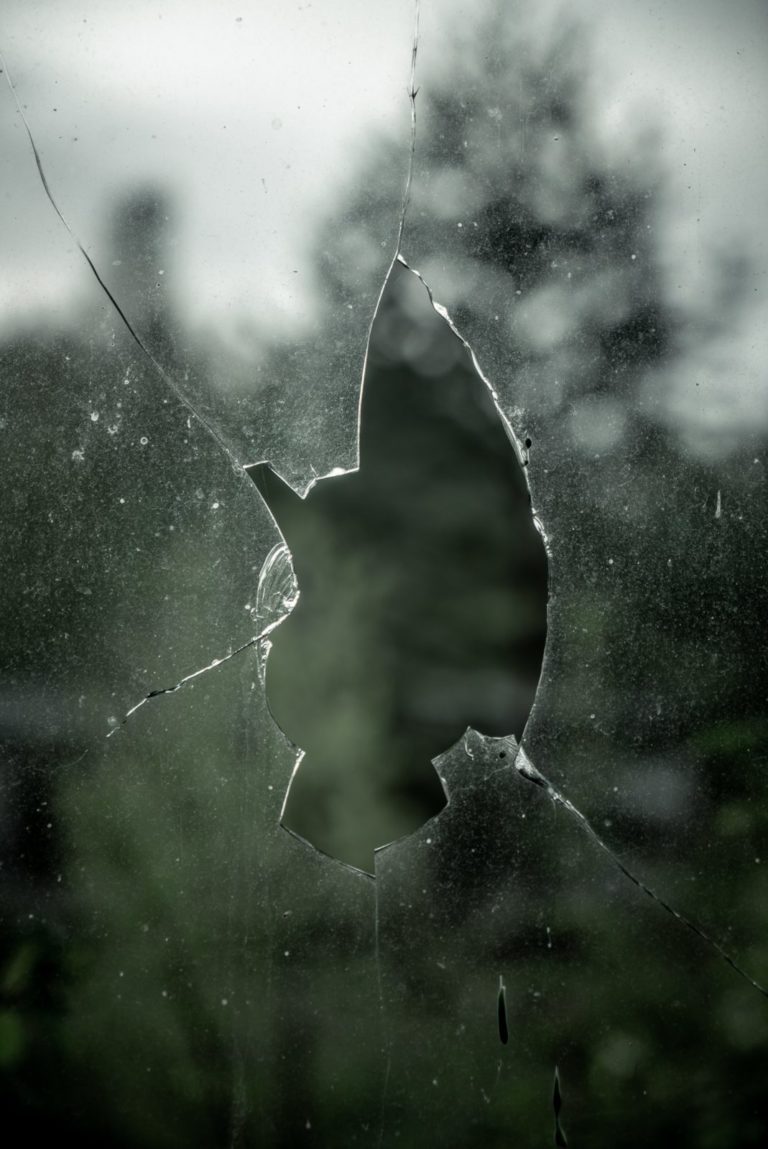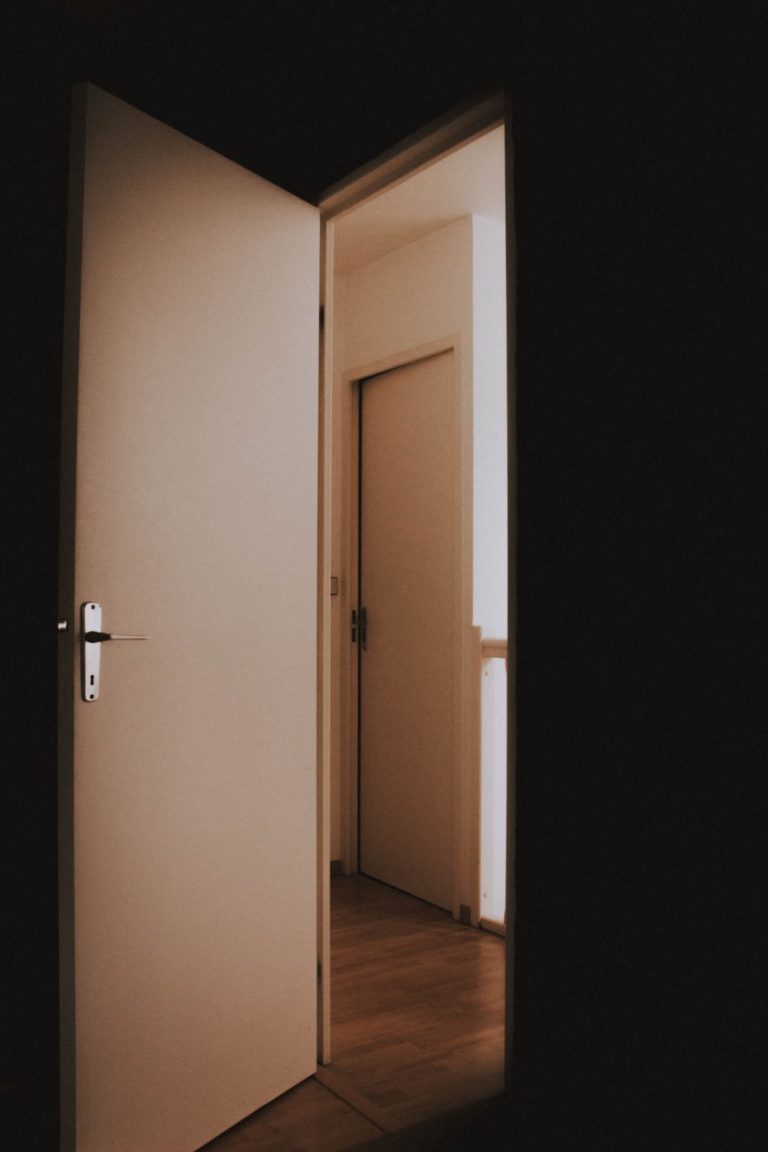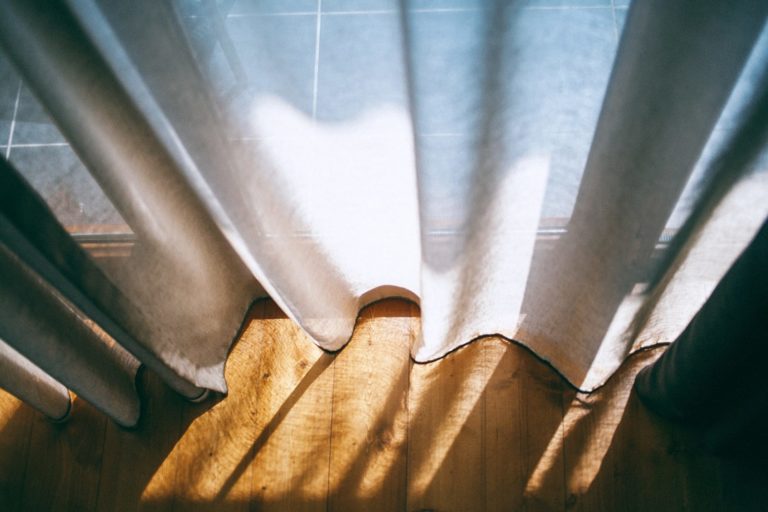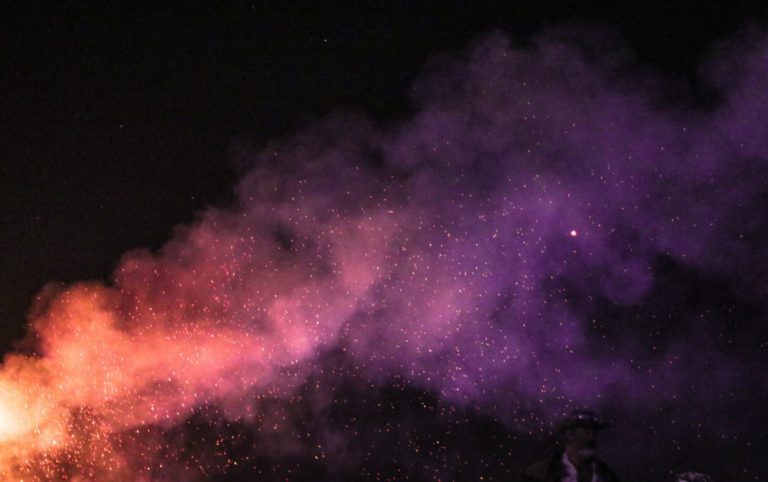We didn’t pay attention to the sirens. Our northern New Jersey town is large enough that car accidents, fires, and petty crimes happen every day, and we are civic- minded enough not to complain about the taxes we pay for our responsive police and fire departments. Rarely do we ever learn what roused the authorities, unless the circumstance is extraordinary—or we later, somehow, put two and two together when we read the Police Blotter column in the newspaper. Usually, the effect on us is that the wailing might pause a conversation, or have us pull over to allow official cars or trucks to pass, or set the dogs crooning, their throats stretched fantastically—but that’s all. Minor inconveniences; generally inconsequential.
So, at first, we barely registered the sounds. It was midday, and many of us were eating lunch outside at one or another of the restaurants in town. The sirens were a distant operetta, then a vapor trail. We went on with our conversations and our sandwiches.
It was lovely out, a freakishly warm day, a harbinger after a long frigid winter. Sometimes it snows in northern New Jersey as late as April, but other years skip spring entirely. It was too early for even that change of season, but we abandoned ourselves to the hint. The sidewalks and ground still harbored a chill, but the air, the balm, coaxed little café tables out of basements and us out of our cautious sweaters. How free it feels to wear less! How pleased we were that we’d lifted weights all winter so our arms were presentable. We found ourselves speaking of our plans for the summer. We joked around. Table after table of women talked the way we do, a combination of intimate detailing of family and work problems, children’s failures and triumphs at school, what we’d heard about so and so’s accomplishments or missteps, concern over events in the world—health care, the economy, the endless wars. At table after table, or on the phone, or in sidewalks, driveways, yards, we took a break from our days. Most of the men were in New York, in offices. We didn’t envy them. We weren’t like our mothers who’d felt so trapped and bored being home. We’d all worked in offices and knew their pleasures and ardors; those of us who wanted or needed to had gone back. We who were here had figured out other careers closer to home, or we did the job of running the house and working in the schools or local charities. We’d struck a balance, and on such a beautiful day, we felt as though we’d done it well.
We were happy, too, because we still liked the president, even if he wasn’t all we’d hoped for. Still, he was sane, and wanted the good things, the decent things, for the country. It was such a relief not to feel constantly oppressed and angry—to feel hope again, as we hadn’t for a very long time. We’re a liberal town for the most part, and the breaches of the Bush presidency had distressed us beyond measure. The atmosphere poisoned us, made us paranoid and judgmental. Now, a couple of years later, we felt thawed out, closer to being our real selves, magnanimous and civic-minded, with energy to direct into community action. In spite of all the problems in the world, and our very real money worries, we were waking up from a bad dream. We wanted our children to have faith in the government, too. Our teens had grown up during Bush, and that had made many of them cynical and apathetic. During the 2008 election, while we were knocking on doors and paying close attention to every vicissitude in the polls, we’d had to explain to them why the candidates weren’t all the same, why a good president mattered. Some of the kids were on board, and knocking doors beside us. Others couldn’t see anything beyond their own experience, and for that we couldn’t blame them.
Nevertheless, even the most alienated kids were growing up with good democratic values, and gaining real life experience in our bulging, diverse public schools. Real life experience, in our lexicon, was akin to an adventure destination, like one of the expensive overseas trips where our children did service projects funded by us. What they learned they could either capitalize on or put behind them, depending on the particulars. Either way, experience was important for our children to acquire, up there with high SAT scores and computer literacy. We assumed they were trying drugs and having some version of sex, but better to experiment while they still lived at home, where we could step in if need be. We knew what we’d done when we were teenagers, without nearly as much parental oversight. We gave our children space, but we were watching. Or so we believed.
***
The first inkling we had that there was a real problem—one that might affect us—came, as you’d expect, via cell phone. Someone had heard from someone whose neighbor’s son volunteered as an EMT on the ambulance that there was a serious situation involving kids. This got our attention fast, and it raised questions. Kids? It was a school day. It must be little kids, a prospect that chilled us. We took a quick mental inventory of where our children were—at school, with a babysitter, all accounted for at that hour. When we were sure we didn’t have to worry, we went back to our conversation, though we maintained an attitude of concern and vigilance. When our phones buzzed or played their happy dance tunes, we grabbed them. The ambulances and police cars were on Rumm Road. Rumm Road? Who did we know there? It was one in the richest streets in town, characterized by big houses and gardens on large lots, but perhaps even more by its distance from the trains and bus routes, implying drivers who fetched the hedge fund managers in the morning, or occupants who didn’t have to travel to the city every day. It also implied private school. Ours is a town that sends its kids to the public schools, for both practical and philosophical reasons. Yet there was a cut off to this commitment, an income level above which most people chose otherwise. Children who lived on Rumm Road went to private school, so chances were we didn’t know them. We might have drawn comfort from this, and from the probability that the family concerned had the resources to handle whatever had happened. Yet the word ‘children’ cut through all boundaries. When we heard the street was being cordoned off at both ends, we were electrified, and not in a good way. Though it made no logical sense, we decided we’d better go home, just in case; we all felt the need to crawl into our caves and be there when our kids arrived home. We split our checks and embraced, promising to call with any further news. One of us articulated the guilt that many felt for having forgotten all responsibility while we sat in the sun. It was nonsensical, but everyone understood.
On our drive home we called our husbands’ office numbers in the city, and as we waited for them to answer, or to be put through, we held our phones tight, wanting something from them, some centering response, though we knew it wasn’t coming. Not that they were insensitive–or uninvolved in the way our fathers had been. It was just that when they left us in the morning, their minds turned wholly to other matters, and they couldn’t easily shift back to the home front—it took the length of the commute for that. We knew and accepted this, but it was a frustration and a loss. Our early days as couples, the equal years, were over. The children had come, and come between. Some of us admitted the truth aloud; that if you could only save one, them or your husband, we always said children. The children. No question.
I wish I could talk longer, but I’ve got to go into a meeting, our husbands said.
Yeah, I’ve got to get things to do, too.
Keep me posted.
Uh huh.
We hung up feeling quite alone, but what did we expect? A local drama didn’t affect our husbands in the same way. They didn’t really live here, not the way we did; they only slept here at night and did errands on the weekend. On Monday mornings, even if they grumbled, they seemed eager to board the train into the city. It didn’t mean they cared less, or had abandoned us—it only felt that way at moments like this, when we were so worried. We wondered—which would they choose, us or work?
There were things you didn’t talk about. Not if you wanted to be happy.
***
The next fact we learned was that the house belonged to people with the last name of Smith, and that the children were in the high school—not children at all. We texted our teenagers—who were supposed to leave their phones at home, though we ourselves told them not to, for we wanted to be able to be in touch—and learned that Clair Smith was a junior with older sisters in college. Is Clair at school today? we texted back. They didn’t know. Then they texted to say attendance was being taken in every class. That never happened—the teachers didn’t monitor the whereabouts of all the wayward kids who slipped down by the tracks to smoke rather than sitting bored stiff in an airless room. Was the head count to do with Clair? What else did the teachers say? Too many maternal questions, now: Our phones sat silent.
It was a long afternoon of waiting, calling, waiting. We wanted our kids to come straight home, but they had sports, performance rehearsals, or band practices they refused to miss. In some cases they simply wanted to hang out—the beautiful weather excited them, too. They were too old to make them obey, and we didn’t want to tell them why we wanted them back. By dinner we finally had them with us. They’d heard, too, by then, and shared information through their own network. Texts, calls, and IMs saturated the air, and the atmosphere grew weighty and storm thick. They checked Facebook, of course, but Clair’s picture wasn’t of her; instead she’d put up a white rat. None of our kids had friended her but we read what information there was on her public profile; she liked a list of bands we had never heard of, had a reading list that might have been prescribed by Noam Chomsky, and supported a long list of progressive and radical causes. A stereotype, and frustrating—until our kids reminded us that we did know who Claire was—she was that weird kid who set up a card table at various locations around town and called out to everyone to sign petitions against everything. Animal experimentation. Global warming. Darfur. Torture. Iran. Iraq. Palestine. All the horrors and injustices, one after the next. Clair was a child warrior in an off-putting uniform of dyed black hair, short skirts worn up high on her pale, plump legs, brief tops that revealed a soft midriff and chubby arms, little stars tattooed on the back of her neck below her chopped-off hair, and a stud flashing from the middle of her tongue when she spoke. She conveyed an aura of vulnerability, yet we wanted to avoid her, even if we were in sympathy with her cause du jour. After a while when we saw her at her table, we crossed the street, or even walked the long way around the block.
We hadn’t meant anything by that, really. We simply didn’t like to be lectured—no more than our kids did. Clair was aggressively confrontational in a way that made it plain she saw us as the enemy. We could tell that even if we signed her petitions, she believed we didn’t really understand what was so wrong with the world. So be it. So we avoided her. What was the point in trying to explain ourselves? We had solid, close relationships with our kids. When they asked, we answered their questions honestly; yes, we’d smoked weed; yes, we’d had sex before we were married. We wanted them to come to us readily, without worrying that they were going to have an awkward conversation full of consternation and shock. We kept an open door and an open mind.
As we got busy with our evening routines, and there seemed to be no new developments, we loosened our grip for a while. When our husbands walked in smelling of stale offices or a shoulder-to-shoulder commute, we were either calm, exasperated, angry, or loving, whatever was usual. We had dinner and threw in some laundry or went back up to our home offices or helped with homework. The teens were still IMing, seeking further intel, but they heard nothing and grew disinterested. A couple of us checked the local gossip sites for news, but nothing came up. There were no reports on TV, either. Good. Maybe it hadn’t been much—a case of a slow disaster day, when the police could make a show of earning their keep. Tentatively, we let go of some of our tension. There were horrible things going on in the world and we didn’t give them short shrift, but we were among the lucky, and we wanted to spend the evening appreciating that. The dark dropped around our houses, and the afternoon’s balmy air cooled considerably, reminding us it really wasn’t spring yet. We turned up the heat, or built what was sure to be one of the year’s final fires. Some of us walked with our husbands around the block, led by our dogs, who sniffed happily at the same spots as ever. We opened our books, settled in front of the TV. It helped to have our husbands around, because they’d never felt our panic of earlier in the day. Our town was the same to them as it had been early in the morning, and we were happy to adopt that perspective. We wanted to go to bed peacefully and wake up to a new Obama day. We liked our lives.
It was close to nine o’ clock when suddenly our teens had some fresh information—the names. There were five girls involved in the incident, whatever it was, all juniors, all girls: Annabelle Canter, Maya Schwartz, Emma Normal-Holt, Clair Smith, and Jamie Goodman. We didn’t know the first four, but Jamie? Little Jamie, who we’d known since she was in kindergarten? Why was she with those others who, according to our kids, were off to the periphery, girls no one really knew? What had happened? We got on our phones again, and passed around a rumor attributed to someone who knew someone who worked at the hospital that the girls had been arrested and were at the police station. This relieved us; they’d be safe there. Even so, we went around the house, making certain all the locks and windows were secure. Every so often a robber was on the loose, and the police would go house to house, looking for him. There’d be searchlights, news reports. No, this wasn’t that kind of community drama; this was a hole in our universe through which these children had slipped.
***
For several years, everyone we knew had been against the war in Iraq. We’d been split in the beginning, some of us moved by the revelations about the torture chambers of Saddam Hussein and excited by the prospect of pruning him from the banks of the Tigris and Euphrates. Colin Powell was a respectable, impressive man, courtly, reassuring in his combination of soft, thoughtful features and mature military rectitude. A good many of us believed his Senate testimony about WMDs—though not all. Some of us had watched the 2001 testimony of Hans Blix and believed him that the weapons were gone. In any case, by 2003 we were all against the war, writing emails, signing petitions, marching. We hoped our children wouldn’t enlist, though we didn’t specifically tell them not to—that had to be their choice. We did point out that the Bush girls weren’t there, which was a clear indication of how little the president valued the outcome. There weren’t many examples of service being set for the middle classes. The wars had changed since our parents’ time. We hated the practices of recruitment among the poor, the inequity of the pain suffered. In principle, we saw the point of Charles Rangel’s universal draft bill—it only made sense to spread the loss and responsibility around. However, we privately felt strongly against allowing our kids to go to any of the kinds of wars the country had been fighting during our lifetime—wars about power, greed, control. We’d probably have tolerated them fighting the Nazis, but not everyone even agreed on the necessity of that. Wars were always about economics, and we didn’t want to lose our kids to such a spurious cause. We’d grown up during the era of protests against Vietnam, and we either believed in or had sympathy for pacifism. Kids from our high school did enlist, but they fit the demographic of the Iraq fighters in general. We regretted this and regarded it with sorrow.
When recruitment materials arrived in the mail for our kids, we tore them up instantly and stuffed them beneath the garbage. We wrote letters to the local paper protesting the movie theaters blaring ads for various branches of the military—particularly the depressing National Guard commercials featuring rock bands and showing soldiers helping kids in Iraq. We knew better, we knew a lot better. We read the Times and blogs and books, we were deeply informed. This was a protection for us, a way to discern where we could be involved and where we should not. We doubted that even Obama could show us a war that warranted the sacrifice of our children. We approved of getting out of Iraq, but why were we still in Afghanistan? Was Pakistan next, or Iran? We wanted an end to all of it. What was wrong with people that they wanted to hurt each other? When we thought of our achievements, one of the greatest was that we’d taken our good luck at being born where we had, when we had, and built that into lives textured with thoughtfulness, in every sense of the word. What would we sacrifice to preserve that? Not our children. That was for sure.
***
Jamie Goodman. We couldn’t grasp it. We knew her. We still saw her often, hanging around. She was in and out of our houses as recently as…recently. She was one of the large band that roved around together on weekends, traveling from basement to basement, having fun. She’d grown from a pretty, skinny little creature with long blond hair into a beautiful girl in flannel shirts and black tights. Not one of the girls who looked to boys for validation. More a type from an earlier era, hippiesque, or maybe a lesbian. She was a good student and belonged to Madrigal. She wanted to go to Bryn Mawr and then get a Ph.D in either philosophy or history. There wasn’t any of the Eddie Haskell about her, though she was better mannered than most. Lovely, we all thought. Not a standout, but very welcome. What was she doing with those other girls, the ones we didn’t know?
Our kids were mystified, too. Jamie was out on the weekends, at this party and that. For a while she’d been with a boy on the Lacrosse team, but they broke up. Yes, it was true that she’d changed after that, had become quiet and serious, but who didn’t get weird when she broke up? Everyone assumed that after a time she’d be her old self again soon.
Had our kids ever seen her with Clair? Now that they thought about it, they did kind of remember them sitting in the plaza together. They could picture her hanging around Clair’s petition tables, the two of them talking seriously. About what? How should they know? They weren’t eavesdropping. They weren’t interested. The high school was socially fluid, and kids made new friends. No big deal. Jamie could be their friend and Clair’s without them being Clair’s friend.
True. That was how it was with us, after all.
Then our kids remembered Jamie Goodman had a Facebook page. We all crowded around.
It looked no different than anyone else’s at first. Party photos, exaggerated biographical info—it seemed Jamie was 23—and suggestive/cute/jokey status reports and comments. Our kids had shown us their pages when they were younger, or we had our own by now. Sometimes we looked at their pages if we had the chance, some of us stood up for privacy. Either way, we didn’t scrutinize too closely—Facebook was a dream book, and didn’t tell us much that mattered.
We didn’t expect a lot now, so we stood back while our kids poked around the links. We tried to think if we knew anyone who worked at the police station, but we did not—an acknowledgement that embarrassed us. On the other hand, we didn’t know the elite level of the Smiths either. Apparently, the husband was a lawyer, so if there were anything going on that required representation, he’d be able to take care of it.
Hey, look at this, our kids said.
They’d clicked a link to a blog called NoNoNoWay. The front page showed a photo of a group in black robes, their arms outstretched. They all stood on what looked like upside down buckets, or wastebaskets—we recognized the reference instantly. It’s them, our kids said. It’s all of them.
All so young; but we didn’t say so aloud.
The most recent post read:
So. We got responses back from our congressional representatives and from the White House to our latest round of letters and they were the usual, some of them not even on topic, or else obfuscating lightweight sentiments about national security. Blah blah blah. We are working on Gitmo, but we bet a million dollars it’s never going to close. That prisoners are innocent are going to be held forever, because they’re too dumb to figure out how to let them go. None of the monsters are going to be prosecuted. Eric Holder is a joke. The Patriot Act has gotten tougher—Obama lied. Ho hum, so what else is new. You have to have a big ego to be a politician, and the biggest ego of all to be prez of the USA. It’s so fucked up. We haven’t been attacked on mainland US soil since 9/11 so we’re supposed to swallow what was done to Jose Padilla, Mohamedou Ould Slahi, Abu Zubayda, Mohammed al-Qahtani, Khalid Sheik Mohammed, Khaled el Maauri, and all the others, how they were TORTURED? We’re supposed to stop following their cases, stop trying to find out who has been rendered and to where? We’re supposed to be sophisticated and understand that the world is not black or white but shades of gray. We’re supposed to think that it’s complicated—that real adults understand such complication. We’re supposed to leave it all to the men who can handle grim reality, so we can go about being school girls and college girls and career girls and girl-moms. We’re not being asked to turn the other cheek; we’re being asked to turn away.
Uh, no, that’s not going to happen. We still can’t sleep at night because Dilawar. We cry thinking of him shivering in a freezing cell, chained naked to the floor, his legs pulped from the infliction of dozens of knee strikes. He was barely older than us, and smaller than most of us, and innocent. It could happen to us! If we do fall asleep we remember him in our dreams and wake up crying. We cry for Al Qatani and the months of torture he suffered at Guantanamo Bay way after he told all the information he knew. Okay he was a terrorist but that doesn’t justify torture. It just doesn’t.( NOTHING JUSTIFIES TORTURE. Torture is crazy. Torture is debased.) We blame him for his criminal intent, but we cry for him too. We cry for all of them, all the time. We will never forget.
People all over the world are being tortured right this second. Children are being tortured by their parents and by each other. Men are torturing women. Guards are torturing prisoners in prisons all across this country. Other governments are torturing their political prisoners. Animals are being tortured in labs and on farms. It has always happened and it always will. There’s no such thing as putting it behind us. Stopping it should be a national priority.
Prosecutions and trials would serve as a reminder and would provide a clear record. We need the truth and we need accountability. We need laws that can’t be so easily broken. An executive order depends on the whim of one person. If it weren’t for the trials at Nuremburg would we have the Geneva conventions? Should we have just put the Nazis behind us?
The past isn’t behind us. Our work is ongoing. Stay tuned.
We were dumbfounded. This was strong stuff, impressive stuff, but it did seem of the past. Oh, it wasn’t, of course—we knew that. They were right that we weren’t thinking of it anymore, though. We had moved on—but we were still responsible, solid citizens—it wasn’t as if we didn’t care about the world. Why not think about Afghanistan? The deficit? Joblessness? Social security and medicare? Global warming? Especially that—people were being tormented by the weather, and that was going to get worse very quickly, by all predictions. Why didn’t the girls have their minds on that? They were serious; but they were also stuck.
Yet, as we scrolled down through the posts, our old rage at the brutality and sense of shame came back. We felt indignant on their behalf; the blog was a sad record of rebuff and frustration. The girls had posted the letters they’d written to President Obama, Attorney General Eric Holder, Secretary of State Hilary Clinton, CIA Director Leon Panetta, President Bush, Vice President Cheney, Secretary of State Condoleeza Rice, Secretary of Defense Donald Rumsfeld, Major General Geoffrey Miller, names down the chain of command that we’d never heard, different senate committees, our state senators, and our congressmen, the Democratic candidates, begging them to end the torture and to shut down Guantanamo Bay, the black sites, The Dark Prison, etcetera, immediately. After each letter were the replies, all written in governmentese, long-winded sentences saying nothing, all signed with an autopen. The girls kept careful records of these deflections, and they commented on them to each other.
So this is how our “democratic” government deals with concerned citizens!
How depressing is this?
Does anyone even understand what this letter means?
They seem to think we’re stupid. Ha!
We wanted to jump into the blog and explain to them how the world worked, and to assure them there many positive things about the country—so many people doing good. We wanted to tell them that while it was important to protest against torture and to be aware of such matters, to obsess about it was too grim—how would you get out of bed in the morning if this were all you thought about? There was a point to living a secure, productive life, even while terrible things were going on. We were old enough to know that living well really was a form of, if not precisely revenge, at least fighting back. Weren’t we holding out for a better life? We told our kids that when they saw the girls again they should get them involved in other activities, steer them away from this stuff.
We’ll call Jamie, they said. We’ll have a party for her, and she can bring the others if she wants to.
We really had nice kids.
We went back to the blog. They’d gathered a lot of information and had links to a long list of memos regarding approvals of torture techniques and records of interrogations and policies that had been obtained by The New York Times, the ACLU, the Center for Constitutional Rights, and various others. We clicked through to the Rumsfeld memo approving enhanced interrogation techniques, and the Yoo-Bybee memo that defined the crime of torture as requiring intent. We’d only read bits of them in The New York Times, disturbing, awful, crazy stuff. Who thought like that? What manner of depraved human would condense hours, days, weeks of brutality and pain into a few flat lines, a tricky legal argument? We considered our blackest hearts, the moments when we’d seen what we might be capable of if our children were threatened. We could kill; we could. This was different. This was murder by pen, from a desk far away from the carnage. We didn’t understand—thank goodness.
They’d written a summary of the particulars leading to the death of Afghan taxi driver Dilawar—it seemed they’d read hundreds of pages of testimony. Was this really true? It sounded fantastical. This wasn’t how U.S. soldiers behaved. This was depravity. How could you take a boy out of a taxi and literally pulverize him to death without having any notion of his innocence or guilt? We were sickened, disturbed. In a state of compulsive fascination, we moved on to read snippets of the long description the girls had posted about the interrogation of Al Qatani, the 20th hijacker, at Guantanamo Bay. It had gone on for weeks and weeks and consisted of such sadistic treatment that it bent the mind trying to grasp it.
We asked our kids how much they knew about all this. They were 16, 17, 18, almost grown. Old enough to be making plans, to dream of leaving our houses. We didn’t know how late they stayed up, or what they looked at on their computers. We didn’t monitor their every move; the point was for them to be discerning citizens, good progressives, informed and ethical. They knew as much as we did—a bit more, as some of them had discussed parts of this information in school. Yet they had the same sensation of being overwhelmed at seeing all of this at once. There were so many memos, reports, documents, descriptions of interrogations and extraordinary renditions. It was a different experience to read about them every so often in theTimes, or in a book, than it was to see the actual documents. We all agreed we’d come back to these links and read them carefully. We were beginning to understand that we knew, but we didn’t know—not enough. The girls with their tippy card table had had something to tell us.
Then we came to the Abu Grahib photos, a lot more of them than we’d seen in the paper or on the news. There were also other images we’d never seen or heard of; photos of rape, photos of extraordinary sadism. We only looked at these for a few seconds—enough to see the range, the scope. They were too hard to look at for long, yet we felt guilty when we scrolled past them. Wasn’t looking the least we could do? People had lived these moments, time had passed in these extreme states of anguish; it was real, it had happened; how could we turn away? There was a sense of dishonor in doing so; a knowledge that the truth could not be left to the imagination, for the mind would likely protect itself. Pain can’t even be known except at the time of pain; thought can’t reproduce those feelings, it isn’t like thinking of a lemon and feeling the mouth seize up. Pain is its own separate dimension—the body needs to forget it when it ends. Yet images are hard to forget or deny. We all carried disturbing pictures within us that we wished we’d never seen. Once viewed, they were part of what we thought of as the world. We believed we should spend time with each on of these, absorb and honor the pain a person had gone through, not turn our eyes away—but that was more than we could manage at the moment. We were tempted to ask the kids not to look, but this was the world they were near to voting on. It seemed hypocritical to forbid them when there were others their age in the war, on both sides. This was war. They should know.
The next post showed the girls sitting at the table in front of Betty’s Dress Shoppe, calling out for people to sign their petition. There was a montage of headlines fromThe New York Times having to do with torture, set to a hard music we didn’t recognize. We fast-forwarded through the girls interviewing each other, stopping only long enough to realize one of them was pretending to be Charlie Rose, the other giving answers that became clearer and more pointed with each round of comments and suggestions. They were working at becoming cogent and persuasive, little lobbyists in the making. They had a lot to say; it was admirable of them to practice how to say it.
It was nearly eleven, and we still had no real information about what had happened—arrests, it seemed, but for what? We were turning off lights, brushing our teeth, emptying the dishwasher, when our kids called out to us. A post had popped up on the blog. Our first thought was that this meant it was over—that the girls must be home. No, our kids said, not necessarily. You can specify a time for a post to go out. Of course. We knew that—we received timed posts from blogs to which we subscribed. We were tired, and not thinking clearly anymore.
Some of our husbands decided to go to bed, but most chose to watch with us. We were glad of this; it was best for the kids.
The post was yet another video. We saw a large bedroom decorated sumptuously, for a girl of indeterminate age—a pile of stuffed bears sat on a chair, but there was a poster for Michael Hanneke’s film of The Castle. The computer voice read a statement.
We conclude that certain acts may be cruel, inhuman, or degrading, but still not produce pain and suffering of the requisite intensity to fall within Section 2340A’s proscription against torture. We conclude that for an act to constitute torture it must inflict pain that is difficult to endure. Physical pain amounting to torture must be equivalent to intensity to the pain accompanying serious physical injury, such as organ failure, impairment of bodily function, or even death.
Cut to: A girl on the bed, on top of a bright blue plastic tarp. Her head was covered with a towel, and she wore an orange jumpsuit—a clear reference to Guantanamo. Her hands and feet were tied to the canopy bedposts with belts, one of them pink terry cloth, from a bathrobe. The rest of the girls moved into view, all of them wearing the same outfit, all of them in the black ski masks that we’d come to associate with terror. The impersonal, robotic voice continued its atonal loop, for an act to constitute torture it must inflict pain that is difficult to endure. What did that mean? Who could judge another’s capacity for endurance? What were the signs—screaming, fainting, madness? It made no sense. We struggled with the words as we watched the figures shift their young bodies gracefully around each other—familiar gestures under the strange clothes. One girl picked up a crystal pitcher from the bedside table and held it poised over the towel while another set her hand over the spot where the nose poked up. We both knew and didn’t know what this was. We hadn’t seen water boarding, and had only vague conjectures as to how it took place. Mainly we had the word—water boarding. Appalling that it mimicked the name of a sport, but deceptive words were part of the game. What were these girls up to? Oh, they were tough, and brave, but this was unnecessary. Everyone condemned water boarding except for a handful of people. We knew the guilty parties by now, and didn’t need convincing. What was their point?
The one girl poured, and the covered girl sputtered and choked. Soon she began to writhe, and the girls soothed and patted her. Though there was no sound beyond the looped voice, we saw them whispering to her, too, coaxing her along. She coughed violently and the bed shook. The pouring went on. Were these girls nuts? This was dangerous! We were dizzy, beside ourselves. Most of us shut the computer down. But some of us continued watching—we had to know.
Eventually the body stopped moving, and the girls removed the towel and untied her. Her features were slack, her skin was turning gray, but we could see it was Jamie. The other girls took her by the shoulders and feet and moved her to the soaked rug. Then they took off their masks and breathed deeply. Two of them were weeping. The other two had hard, grim faces, disturbed but determined. One of those was Clair. She looked at the remaining three and spoke clearly enough that we were able to read her lips. Who’s next?
We began to drown, too, and couldn’t watch anymore. We weren’t real witnesses.
***
In the days to come there would be a rumor that the video showed four girls drowning. The fifth, presumably Clair, posted just before committing suicide by getting in a tub with a lamp. We’d never know if this was true, because the site was taken down before anyone we knew looked at it again. The next afternoon it was confirmed that all the girls were dead. All five.
That night, we didn’t know this for sure; we were still hoping. We finally got our kids to sleep with the help of Melatonin and tranquilizers. At dawn it began to snow, though not hard enough that school was cancelled. Nevertheless, those of us who usually went into the city decided to claim the weather as an excuse to work from home, so we’d be together when the final news came in. We checked on our kids often, walking into their familiar rooms where we stood bewildered, questioning everything we thought we knew. The toys and trophies and posters were all so innocuous, the scents of their sleeping bodies so wholly known and accepted. Yet a mystery had arrived overnight, as it had for so many people all over the world. We arranged our children’s blankets, making them neat. There was nothing else we could do. How would we tell them the truth about what had happened? Not the fact, but the why of it—how could we explain? What would they understand of it, how much? There was no good resting place on that continuum. There was only pain.
The snow brought a time of silence. We thought of the ending of “The Dead” by James Joyce, that most lovely and evocative combination of words and sounds. His soul swooned slowly as he heard the snow falling faintly through the universe and faintly falling, like the descent of their last end, upon all the living and the dead.
Yet we couldn’t take refuge in the poetry, the sublime sibilance. Our souls did not swoon. Our souls were vigilant, alert. In the distance we heard a wail, mechanical, repetitive. Maybe it was in our town, maybe in another—maybe all the way out on the Parkway, where cars were surely sliding around. This was what we had now; we had an ear for sirens.
We looked at our kids from their doorways. We did not wake them up.

